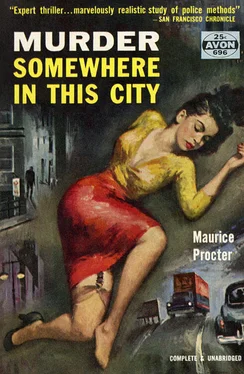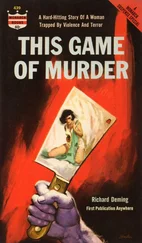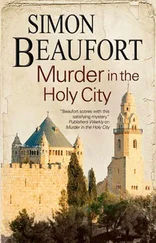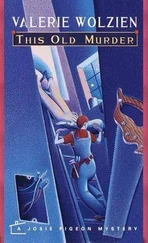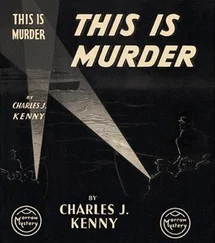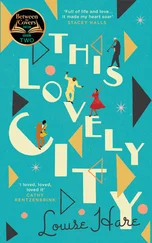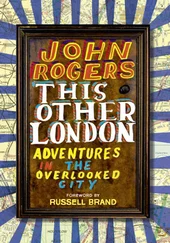Maurice Procter - Murder Somewhere in This City
Здесь есть возможность читать онлайн «Maurice Procter - Murder Somewhere in This City» весь текст электронной книги совершенно бесплатно (целиком полную версию без сокращений). В некоторых случаях можно слушать аудио, скачать через торрент в формате fb2 и присутствует краткое содержание. Год выпуска: 0101, Издательство: Avon, Жанр: Полицейский детектив, на английском языке. Описание произведения, (предисловие) а так же отзывы посетителей доступны на портале библиотеки ЛибКат.
- Название:Murder Somewhere in This City
- Автор:
- Издательство:Avon
- Жанр:
- Год:0101
- ISBN:нет данных
- Рейтинг книги:5 / 5. Голосов: 1
-
Избранное:Добавить в избранное
- Отзывы:
-
Ваша оценка:
- 100
- 1
- 2
- 3
- 4
- 5
Murder Somewhere in This City: краткое содержание, описание и аннотация
Предлагаем к чтению аннотацию, описание, краткое содержание или предисловие (зависит от того, что написал сам автор книги «Murder Somewhere in This City»). Если вы не нашли необходимую информацию о книге — напишите в комментариях, мы постараемся отыскать её.
Murder Somewhere in This City — читать онлайн бесплатно полную книгу (весь текст) целиком
Ниже представлен текст книги, разбитый по страницам. Система сохранения места последней прочитанной страницы, позволяет с удобством читать онлайн бесплатно книгу «Murder Somewhere in This City», без необходимости каждый раз заново искать на чём Вы остановились. Поставьте закладку, и сможете в любой момент перейти на страницу, на которой закончили чтение.
Интервал:
Закладка:
There was still time for one drink. Thirty yards away was the Lacy Arms. He had kept away from that place since he came out of hospital. “I have an appointment,” he remembered. “Must keep my appointment. I’m only about four months late.”
Though she was busy, Lucky Lusk saw him as soon as he entered the bar. She came straight toward him, and stood opposite him. Around him, customers were clamoring for rounds of drinks before closing time. He grinned at her. “One large whiskey,” he said.
“Why didn’t you come before this?” she asked.
“I’ve been a wounded hero, didn’t you know?” he said. “I’m better now. I start work tomorrow.”
She could not carry on the conversation. There were too many calls upon her attention. She gave him the whiskey. “I’ll talk to you in a minute,” she said.
When the manager had firmly shouted: “Time, ladies and gentlemen, please,” she returned to Martineau. “Will you wait for me?” she asked. “I have to tidy up here.”
He nodded, and pushed his empty glass toward her. “Never mind,” she said. “You can have a drink at my place.”
As she collected glasses she stole glances at him. To her, he looked as if he were in a reckless mood. “This is it,” she thought, but she was afraid of keeping him waiting too long. She held a brief conference with another barmaid. The other girl looked curiously at Martineau, and nodded. She would wash the glasses for Lucky.
“I’m ready now, love,” said Lucky to Martineau. “I’ll just get my coat.”
Soon they were walking toward Lucky’s home. His hands were in the pockets of his overcoat-a posture not usual with him-and she hugged his arm and kept very close to him, matching his strolling step. Martineau thought that this was a very cozy way of getting along. They walked in harmony. When he walked with Julia they were always going somewhere, full of purpose: he strode and she stepped briskly beside him, with her hand scarcely resting in the crook of his arm.
This was better, just sauntering along. Martineau began to feel very affectionate toward Lucky. He could drift along nicely with her.
Lucky, on the other hand, was planning for what she expected to happen. “He won’t carry anything around with him,” she told herself. “A man like him wouldn’t.” Still, she had to get to know something.
“You’ll be careful, won’t you?” she said.
“Careful?”
“Yes. Er, you know… I can’t afford to have a baby.”
“Careful! That’s no good,” he said bluntly. “It’s too late to be careful.”
“Never mind,” she said quickly. “I’ll call at the all-night chemist’s, and get something.”
“Is that necessary?” he demanded.
“Of course it is, silly. You know what could happen.”
“Well, let it happen,” he said rashly. “I could do with some family. If it does happen, I’ll get a divorce and marry you.”
“Would you really?”
“Of course I would,” he affirmed.
She was silent for a while. Some part of her thoughts made her squeeze his arm. Then she said: “No. The marrying part is all right, but I don’t want any kids. I’m not the sort of woman to have kids.”
“Don’t you ever want any children?” he asked. “Not even when you’re married?”
“No. They’re not my cup of tea at all.” She squeezed his arm again. “I just want you.”
They came to the corner where the chemist’s shop was open. “Wait here,” she said. “I won’t be a minute.”
He stood at the curb and lit a cigarette. He blew out smoke pensively. So Lucky was another one who would not have children on any consideration. You do find ’em, Martineau, he reflected.
It was a busy corner where he stood. Crossing lights winked, and traffic stopped and started. People were hurrying home after their evening’s entertainment. The anonymous thousands, going back to the places where they scratched and toiled in innumerable ways to make a living. They did not really belong to Granchester. This was Granchester, this less-than-a-square-mile in the center of things. There was no hotel district, no theater district, no financial district, no administrative district. There was just the middle of Granchester, which, for Martineau, had everything. He belonged here, and so did Lucky Lusk. Julia did not. She was suburbanite to the core.
He thought of Julia’s Granchester; and of other districts, within the city boundary, which were not the real Granchester. Not half a mile from where he stood there was a section which housed many colored people. It had no name, but some people called it Dixieland. There were Jewish and Irish sections. There were sections, recently respectable, which had been made into slums by new inhabitants. There were the residential areas. But they were not recognizably Granchester, because they could have belonged to any city. Here, around here, where the buildings-and very often the people in them-had definite and perceivable characters, was the real Granchester.
Don Starling had belonged here. Martineau still did. Lucky did. Sinners. Sinners, rats, and people who unwillingly fed the rats.
“I wouldn’t like to be anywhere else,” Martineau decided.
A taxi passed near, with a young colored man at the wheel. Colored taxi drivers and colored bus conductors. That was something Martineau had never seen in London, the Big Smoke. Well well. What Granchester does today, London does tomorrow.
Another taxi approached. The driver checked, and swerved hopefully to the curb. Martineau put up his hand.
He got into the taxi and gave his address. Then he said: “She doesn’t want any kids. She never had a man who was any good.”
The taxi driver took no notice. People said all sorts of daft things to him.
Martineau did not speak again until he had alighted at his front gate. He paid the driver and gave him his tip. “Good night,” he said solemnly. “When in doubt, put somebody in the family way.”
5
“This is it,” said Martineau as he walked round to the back door. “Home, the place to go when every other place is closed.”
The door was unlocked. One thing about Julia, she wasn’t afraid of things. She had courage and good nerves. “Well, I must have married her for something besides her looks,” he murmured.
She was waiting for him. She looked at him searchingly. “You’ve excelled yourself today,” she said with surprising calmness.
“Yes indeed,” he agreed. “Sorry I’m late. I fell asleep in my new office.” He threw his hat in the general direction of a chair, and never looked to see where it fell. Then he slipped off his overcoat and absently reached out with it, to where there used to be a hook behind the living-room door. Julia had removed the hook about the time he was made Chief Inspector. He never noticed when the overcoat dropped to the floor.
He rubbed his hands together. “Any supper?” he asked, suddenly realizing that he was hungry.
“In the oven since teatime,” she said. “As usual.” Then, quite coolly: “I don’t know how long you think I’ll stand this state of affairs.”
“Me neither,” he said, walking toward the kitchen. “I don’t know how I stand it myself.”
“Stupid brute,” she said, suddenly and clearly. “I’m going to bed.”
“Good night,” he answered, turning the oven switches.
Julia went to bed. Martineau lit a cigarette, and decided that his life was in a mess. It occurred to him that some soft piano music couldn’t make Julia more angry, and he went into the front room. He turned on the light and then stood in complete amazement. The piano was missing. In its place, grandly alone on the fitted carpet, was a console television set.
Читать дальшеИнтервал:
Закладка:
Похожие книги на «Murder Somewhere in This City»
Представляем Вашему вниманию похожие книги на «Murder Somewhere in This City» списком для выбора. Мы отобрали схожую по названию и смыслу литературу в надежде предоставить читателям больше вариантов отыскать новые, интересные, ещё непрочитанные произведения.
Обсуждение, отзывы о книге «Murder Somewhere in This City» и просто собственные мнения читателей. Оставьте ваши комментарии, напишите, что Вы думаете о произведении, его смысле или главных героях. Укажите что конкретно понравилось, а что нет, и почему Вы так считаете.
